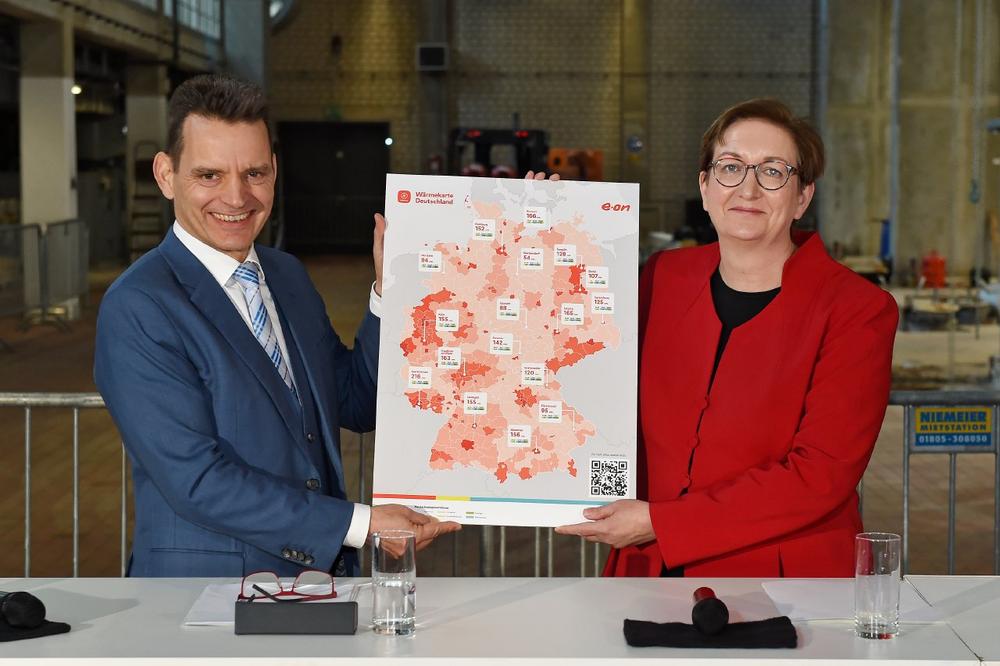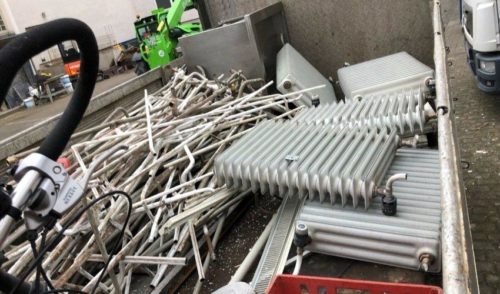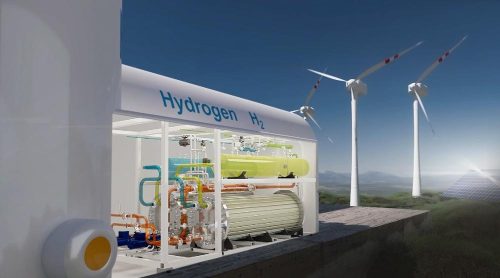
E.ON supports municipal heat transition with digital heat map
- Federal Ministry of Housing, Urban Development and Building and E.ON present heat map for Germany
- Interactive application provides freely accessible information on heat demand, technologies, CO2 emissions and renovation status for every municipality and postcode area in Germany
Together with Klara Geywitz, Federal Minister for Housing, Urban Development and Building, E.ON today presented a digital heat map for the whole of Germany. The interactive application shows the current status of heat supply in all 11,000 municipalities and around 30,000 postcode areas in the country. With this comprehensive and freely accessible tool, E.ON is making it easier for people to get involved in municipal heat planning and thus supporting the energy transition in the heating sector.
Klara Geywitz, Federal Minister for Housing, Urban Development and Building: “The development of a digital and interactive heat map is a really good initiative that can help local authorities, citizens and companies to switch to climate-friendly heating. It complements our new Heat Planning Act, which will enable states and municipalities to fully exploit the potential for appropriate local heat supply. After all, a new heating system is not an impulse purchase. It is an investment for the owner and requires long-term planning. Anyone switching to a new heating system needs a lot of information and answers to many questions. A comprehensive heating map can help provide clarity.”
Leonhard Birnbaum, CEO of E.ON SE: “The climate goals can only be achieved with an intelligently planned and efficiently implemented heat transition. We want to contribute to this – pragmatically as well as with an open mind to technology and a consistent focus on digitalization. With our digital heat map, we are helping cities and municipalities to get started with heat planning. As an energy partner to around 6,000 municipalities in Germany, we will then discuss concrete solutions. We offer our customers technologies for climate-friendly heat generation and distribution.”
For the first time, the digital heat map gives local authorities and citizens the opportunity to get an overview of the local status quo of the heat transition. It shows at a glance the heat demand, CO2 emissions, distribution of heating technologies and renovation rates in existing buildings – for each federal state, city, small municipality or postcode area. In this way, the map provides an entry point into the complex process of municipal heat planning. It gives states and municipalities an immediate basis for assessing the scale of the challenge on the ground and starting concrete planning.
As the digital heat map is comprehensive, interactive and freely available to everyone, it reinforces the collaborative and participatory approach. Each municipality has the opportunity to learn about the situation in neighbouring municipalities and to initiate cooperation. Citizens can participate in the heat planning process based on the data. The heat map is based on a technology platform from E.ON company DigiKoo, which supports municipalities and other stakeholders in digital and efficient heat planning.
Heat accounts for more than 50 percent of Germany’s energy consumption. Accordingly, the heat transition is considered to be the central, but also the most challenging, component of the transformation of our energy system. By 2045, Germany is supposed to heat climate neutral. Today, more than 80 per cent of heating needs are still met by fossil fuels. With the Act on Heating Planning and Decarbonization of Heating Networks, the German government is requiring local authorities to draw up heating plans. These plans set out how local heat supply can be transformed towards climate neutrality.
The E.ON heat map is available at www.eon.com/waermewende.
About DigiKoo:
DigiKoo GmbH, based in Essen, is the digital core of the energy service and infrastructure provider Westenergie AG. The company provides information that municipal utilities, municipalities, network operators and energy supply companies can use to shape the energy transition throughout Germany. Where will how many charging stations for electric cars need to be built in the future? How is the need for renovation to efficiently heat buildings developing? DigiKoo GmbH gains such insights using specially developed software, DigiPAD. The employees prepare data in such a way that reliable statements about the status quo and forecasts in the areas of electricity, transport and heat are possible. For more information, visit www.digikoo.de.
This press release may contain forward-looking statements based on current assumptions and forecasts made by E.ON Group Management and other information currently available to E.ON. Various known and unknown risks, uncertainties, and other factors could lead to material differences between the actual future results, financial situation, development or performance of the company and the estimates given here. E.ON SE does not intend, and does not assume any liability whatsoever, to update these forward-looking statements or to align them to future events or developments.
E.ON is an international investor-owned energy company headquartered in Essen, Germany, which focuses on energy networks and customer solutions. As one of Europe’s largest energy companies, E.ON plays a leading role in shaping a clean, digital, decentralized world of energy. To this end, around 72,000 employees develop and sell products and solutions for private, commercial and industrial customers. More than 47 million customers purchase electricity, gas, digital products or solutions for electric mobility, energy efficiency and climate protection from E.ON. For more information, please visit www.eon.com.
E.ON SE
E.ON-Platz 1
40479 Düsseldorf
Telefon: +49 (201) 18400
Telefax: +49 (211) 4579515
http://www.eon.com/
Telefon: +49 (173) 6840253
E-Mail: isabel.reinhardt@eon.com
![]()




